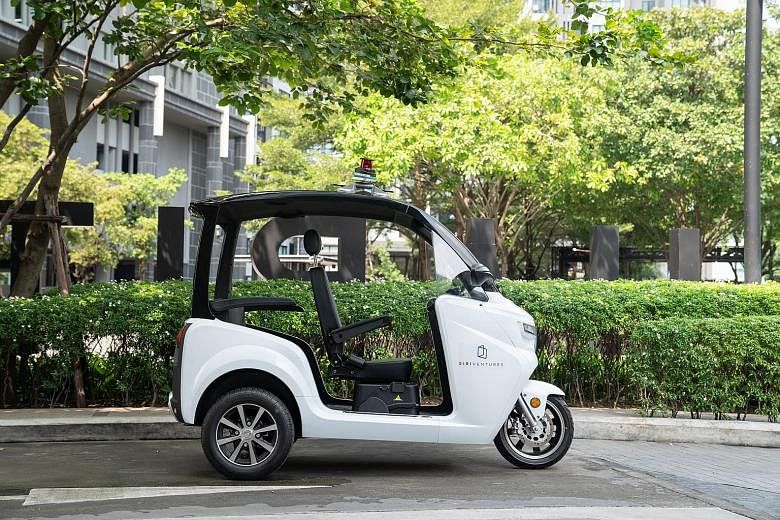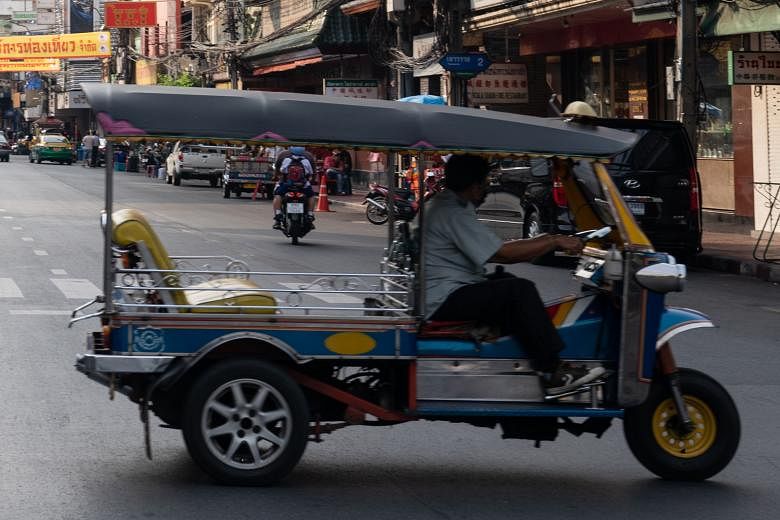BANGKOK • Thailand's ubiquitous tuk-tuk, the noisy, colourful three-wheeled taxi that has been belching exhaust on the roads for almost a century, is getting a cutting-edge makeover to help carry the local auto industry into the future.
Come November, a public-private partnership will test the nation's first self-driving tuk-tuk in an effort to nudge Thailand towards the forefront of developing autonomous-vehicle technology in South-east Asia.
Start-up Airovr, investor Siri Ventures and the Thai government will run the trial inside a gated Bangkok community, in the hope that what they learn can be transferred to bigger vehicles such as minibuses.
Most autonomous-driving advancements in Asia come from Chinese and Japanese companies - like Baidu and Toyota - spending billions of dollars on software development, tie-ups and road tests.
South-east Asia does not have a local champion, so Thailand views the technology as a way to bolster an auto industry generating 12 per cent of its gross domestic product.
"The programme can build confidence among regulators and users that these vehicles can be used on public roads," said Mr Ekkarut Viyanit, principal researcher for the National Science and Technology Development Agency. "This will accelerate acceptance of the technology in Thailand."
The tuk-tuk was chosen as a test vehicle because the three-wheeler is more energy-efficient than a car, requires fewer parts, is cheaper and also more suitable for the country's hot weather, said Mr Amares Chumsai Na Ayudhya, founder of the Bangkok-based Airovr.
But this is not the usual three-wheeler seen on the chaotic streets of Bangkok and other tourist spots in Thailand. The Airovr model has a minimalist design, with screens depicting speed and how much electricity is in the tank. The three-dimensional mapping system on the roof resembles police sirens and the interior has handlebars to let the tester take control if necessary.
"The tuk-tuk will allow us to gather data in a real environment with mixed traffic," said Siri Ventures chief technology officer Jirapat Janjerdsak. "After thousands of rides, we can analyse all of the feedback and information to scale up the project with bigger vehicles."
The trial could take six months. Developers will analyse the data with the aim of scaling up the programme with its next-generation autonomous vehicles - 15-seat minibuses dubbed "shuttlepods".
Thailand is South-east Asia's car production hub, making almost 2.2 million vehicles last year, and the government is trying to boost investment in electric vehicles (EVs) and autonomous vehicles (AVs) as the global industry moves in those directions. Thailand is also the first country in the region to offer incentives to EV manufacturers and to reduce taxes on sales of their cars.
Driverless vehicles will be built on EV platforms, and autonomous technology will supplement the competitiveness of EVs, said Mr Yossapong Laoonual, president of the Electric Vehicle Association of Thailand.
With total global sales of self-driving cars expected to reach 21 million units in 2035, according to IHS Markit, the country could become the region's production hub.
Yet it will not be easy to move that technology outside the gates. Like many countries, Thailand does not have many regulations on the use of self-driving vehicles on public roads.
A KPMG index measuring countries' level of preparedness for autonomous vehicles this year does not include Thailand in the top 25. Singapore ranks second, Japan 10th, South Korea 13th and China 20th on the index.
Thailand's development agency is working with other offices to formulate plans for the country's roads. The earliest that Thailand could see AVs on public roads would be in 2024, said Mr Ekkarut. The early adopters are expected to be operators of public fleets and ride-hailing services.
BLOOMBERG


